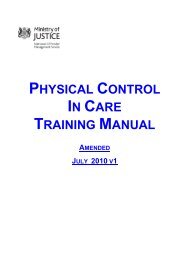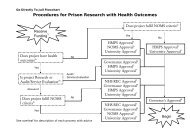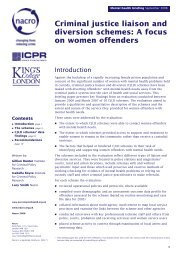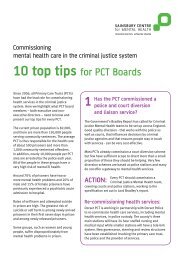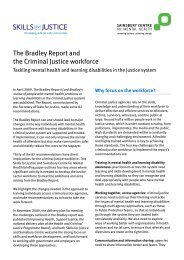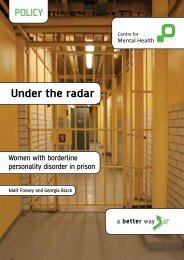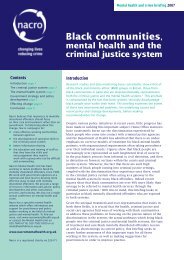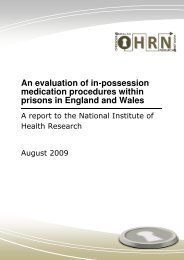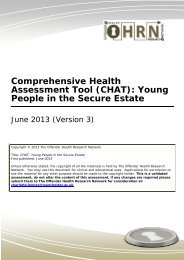Engendering Justice - from Policy to Practice - The Fawcett Society
Engendering Justice - from Policy to Practice - The Fawcett Society
Engendering Justice - from Policy to Practice - The Fawcett Society
- No tags were found...
Create successful ePaper yourself
Turn your PDF publications into a flip-book with our unique Google optimized e-Paper software.
[A woman] had admitted <strong>to</strong> an offence of theft <strong>from</strong>shops. [She] had accumulated a high level of debt;much of this was related <strong>to</strong> her offending as s<strong>to</strong>res wereattempting <strong>to</strong> recoup their losses. She also had supportneeds in relation <strong>to</strong> substance misuse. [<strong>The</strong> woman] hasengaged well with TWP, seeing this as an opportunity<strong>to</strong> address the issues that were leading her <strong>to</strong> commitshop lifting. She was, at the time, in a cycle of offending<strong>to</strong> pay debts that had been accrued as a result of earlieroffending. Her key worker supported her <strong>to</strong> write <strong>to</strong> theretail recovery agency. At first the debt was put on holdand then it was written off. [She] attends ADS <strong>to</strong> addressher substance misuse issues as well as counsellingwith LCWS. She continues <strong>to</strong> engage with the servicealthough this is likely <strong>to</strong> be relatively short term as hersupport needs have been met. For this [woman], referral<strong>to</strong> TWP as a conditional caution was timely and effective.She has been able <strong>to</strong> address issues that she neededsupport with and had not felt previously able <strong>to</strong> solvealone. She has not re-offended since engaging with theservice. 17Requiring women <strong>to</strong> attend a needs assessment opensthe possibility for each individual <strong>to</strong> consider the reasonsbehind their offending and, in turn, makes them aware ofthe support and training available in the community. Thisrehabilitative approach has largely been absent <strong>from</strong> thenational approach <strong>to</strong> conditional cautioning <strong>to</strong> date. Sincethe scheme began in April 2006 until February 2008, themajority of conditions (just under 60 percent) were forcompensation <strong>to</strong> victims, followed by a letter of apology in15 percent of cases and it was only in just over ten percen<strong>to</strong>f cases that participation in a drug intervention programmewas imposed. 18However, the success of the condition aimed at womenoffenders goes hand-in-hand with the provision of supportservices for women on a national scale. <strong>The</strong> Commissionalso recommends that the impact of the scheme is carefullyevaluated and moni<strong>to</strong>red going forward <strong>to</strong> ensure thatwomen who might have been simply referred for assistanceby the local police, without any formal record of the offence,are not being formally cautioned as a result of the scheme.Female Defendants– Experiences of theCourt System and theSentencing ProcessWomen are always the ones who face court for nonpaymen<strong>to</strong>f TV licenses…We get women who havenever been in court before and they are criminalized andtraumatized unnecessarily. Why should this debt be anydifferent <strong>from</strong> any other non-criminal debt [such as] creditcard debt? Also it is women who almost always have <strong>to</strong>pay the fines for their errant children obviously this is fairenough <strong>to</strong> a certain extent, but what about the fathers?Again we get women in court for not sending their children<strong>to</strong> school. I have yet <strong>to</strong> see a father in this position havingbeen on the bench for 17 years.Female Magistrate, Questionnaire Response, March 2009<strong>The</strong> Legal Profession and Legal Aid<strong>The</strong> Legal Services Commission provides publicly fundedlegal aid <strong>to</strong> individuals facing criminal charges through theCriminal Defence Service. Evidence <strong>from</strong> female offenderssuggested that in the majority of cases, female suspectswere satisfied with the advice received <strong>from</strong> their solici<strong>to</strong>r.Many women commented that they were able <strong>to</strong> deal withthe same solici<strong>to</strong>r they had dealt with previously whichmade them feel reassured or were provided with a dutysolici<strong>to</strong>r who explained the process <strong>to</strong> them. However, theCommission remains concerned that there are frequentlydelays associated with the provision of legal advice. Asone woman stated “It wasn’t until the following day thatI was asked if I wanted legal advice which really stressedme out.” 19 This evidence of extensive delay experienced bysuspects <strong>to</strong>gether with the limited time that duty solici<strong>to</strong>rsare often able <strong>to</strong> spend with their clients suggests theduty solici<strong>to</strong>r scheme remains under-resourced: “<strong>The</strong> dutysolici<strong>to</strong>r explained everything <strong>to</strong> me but he was rushing<strong>from</strong> one station <strong>to</strong> another. <strong>The</strong>refore he <strong>to</strong>ld me <strong>to</strong> givea ‘no comment’ interview.” 20 Of particular concern wasthat many suspects who shared their views with theCommission appeared unsure as <strong>to</strong> their options in relationPage 23



